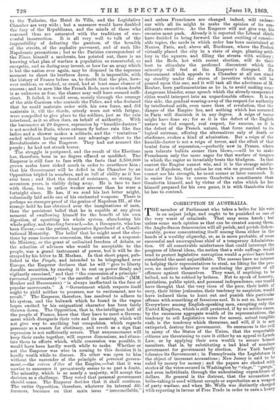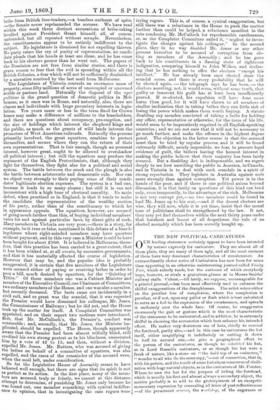CORRUPTION IN AUSTRALIA. CORRUPTION IN AUSTRALIA.
THE member of Parliament who takes a bribe for his vote is an unjust judge, and ought to be punished as one of the very worst of criminals. That may seem harsh ; but unless some such opinion as that can be created among them, the Anglo-Saxon democracies will all perish, and perish dishonourably, power concentrating itself among them either in the hands of a wealthy oligarchy, or, as is more probable, of some successful and unscrupulous chief of a temporary Administration. Of all conceivable misfortunes that could interrupt the progress of liberal ideas, the notion that a wide suffrage would tend to protect legislative corruption would a-priori have been considered the most unjustifiable. The masses have no interest in helping their representatives to steal, no liking for the process, no motive whatever for condoning the greatest of all offences against themselves. They want, if anything, to be bribed, not to be robbed by bribees. Not to speak of honesty, patriotism, public spirit, and personal independence, one would have thought that the very vices of the poor, their habit of envy, their bitter jealousies, their tendency to suspicion, would have induced them to hunt out and punish this particular offence with something of ferocious zeal. It is not so, however. Everywhere among English-speaking men, excepting only the United Kingdom, which is still protected, if by no nobler cause, by the enormous aggregate wealth of its representatives, the tendency to sell Legislative votes for money, actual tangible cash, is the tendency which threatens, and will, if it is not extirpated, destroy free government. So enormous is the evil in many of the States of the Union, that the respectable citizens are threatening to cure it either by an appeal to Lynch Law, or by applying their own wealth to secure honest members, that is, by substituting a bad kind of nominee government for government by election. New York barely tolerates its Government ; in Pennsylvania the Legislature is the object of incessant accusations ; New Jersey is said to .be ruled by money for money ; and the papers are choked with stories of the votes secured in Washington by "rings," "gangs, and even individuals, through the unhesitating expenditure of dollars. So general is the distrust, that the accusation of bribe-taking is used without scruple or reprobation as a weapon of party warfare, and when Mr. Wells was distinctly charged with reporting in favour of Free Trade in order to earn a heavy bribe from British free-traders,—a baseless outburst of spite, —the Senate never reprimanded the accuser. We have read within this week three distinct accusations of bribe-taking levelled against President Grant himself, all, of course, unfounded, but all repeated without scruple. Nevertheless, the constituencies appear to be entirely indifferent to the subject. No legislature is dismissed for not expelling thieves. No party raises the cry of purity of representation, no candidate pleads that his hands at least are clean, and he has come back to his electors poorer than he went out. The papers of the Dominion are not free from similar stories, and there is grave reason to fear that the evil is spreading within all the British Colonies, a fear which will not be sufficiently diminished by a narrative received by the last mail from Melbourne. The Legislature of Victoria controls an enormous mass of property, some fifty millions of acres of unoccupied or unowned arable or pasture land. Naturally the disposal of the ager publicus is the grand question of domestic politics in Melbourne, as it once was in Rome, and naturally, also, there are classes and individuals with large pecuniary interests in legislation. Ten years more or less in the term fixed for Crown leases may make a difference of millions to the leaseholders, and there are questions about occupancy, pre-emption, and the size of holdings which interest the shepherd kings and the public, as much as the grants of wild lands interest the promoters of West American railroads. Naturally the persons primarily involved, the great squatters, combine to protect themselves, and secure where they can the return of their own representatives. That is fair enough, though no personal interest, however great, ought to be allowed to overshadow all political interest ; but still the squatters may produce the argument of the English Protectionists, that, although they fight for themselves, they fight also for a political and social system. The battle between the crook and the plough is also the battle between aristocratic and democratic rule. Nor can we object very strongly to their paying some of their candidates' legitimate election expenses. The system is a bad one, because it leads to so many abuses ; but still it is one not inconsistent with a high tone of electoral morality. Its main defect, when practised as in England, is that it tends to make the candidate the representative of the wealthy section of his party, rather than of the constituency to which he in appearance appeals. The squatters, however, are accused of going much farther than this, of buying individual members' votes for and against particular laws, by direct gifts of cash. Many members in Victoria are very poor,—there is a story, for example, be it true or false, mentioned in this debate of a boarding-house where right-minded members may have quarters without payment, and in this very case a Minister is said to have been bought for about £900. It is believed in Melbourne, therefore, that this practice has been carried to a great extent, that it has been winked at, at all events, by successive governments, and that it has materially affected the course of legislation. However that may be, and the popular idea is probably exaggerated, it LI certain that five members of the Legislature were accused either of paying or receiving bribes in order to pass a bill, much desired by squatters, for the "Quieting of Titles." Of these members one was a Cabinet Minister and member of the Executive Council, one Chairman of Committees, two ordinary members of the House, and one was also a member, but recently deceased. The facts came out incidentally in a civil suit, and so great was the scandal, that it was expected the Premier would have dismissed his colleague, Mr. Jones, the Commissioner of Railways ; but he did not, and the House took .up the matter for itself. A Complaint Committee was appointed, and on their report two motions were introduced, first, that Mr. McCulloch's, the Premier's, conduct was censurable ; and, secondly, that Mr. Jones, the Minister implicated, should be expelled. The House, though apparently aware that the Premier had been almost wilfully blind, still credited his own strong protest as to his blindness, exonerated
him by a vote of 42 to 15, and then, without a division, expelled Mr. Jones. Mr. Butters, who was accused of giving the bribes on behalf of a committee of squatters, was also expelled, and the cases of the remainder of the accused were, when the mail left, under consideration. So far the Legislative House of Assembly seems to have behaved well enough, but there are signs that its spirit is not as perfect as its action. In the first place, many of the mem bers are accused, truly or falsely, we cannot at this distance attempt to determine, of punishing Mr. Jones only because he was found out, one member remarking, with cynical indifference to opinion, that in investigating the case rogues were
trying rogues. This is, of course, a cynical exaggeration, but still there was a reluctance in the House to push the matter further than could be helped, a reluctance manifest in the vote condoning Mr. McCulloch for reprehensible carelessness, or, as the Complaint Committee called it, "neglect to investigate the charges against his colleague." In the second place, they in no way disabled Mr. Jones or any other persons hereafter to be accused of corruption from sitting as members of the Assembly ; and he has gone back to his constituents in a flaming state of righteous indignation, comparing himself to John Wilkes, and declaring that he has nothing to offer the electors "except his intellect." He has already been once elected since the scandal arose, and there is every probability that he will be elected again, — the telegraph says he has been, — the electors asserting, not, it would seem, without some truth, that guilty or innocent his guilt has at least been insufficiently proved. If re-elected, his expulsion will have done more harm than good, for it will have shown to all members of similar inclination that in taking bribes they run little risk of losing the power which makes them worth buying. A statute disabling any member convicted of taking a bribe for holding any office, representative or otherwise, for the term of his life, would seem to be imperatively required in all English-speaking countries ; and we are not sure that it will not be necessary to go much further, and make the offence in the highest degree penal. The objection to the latter course is that the accused must then be tried by regular process, and it will be found extremely difficult, nearly impossible, we fear, to procure legal evidence of guilt, the bribers having the keenest interest in making the public believe that their majority has been fairly secured. But a disabling Act is indispensable, and we regret deeply to see how unwilling the public in America, in Canada, and in Victoria is to deal with such scandals in a spirit of strong reprobation. They legislate in Australia against scab more strongly than against corruption. Yet power is in the hands of the poor, and if there is one political axiom beyond discussion, it is that laxity on questions of this kind can tend only, even temporarily, to the advantage of the rich. Melbourne is not very corrupt yet,—no two members could be found to lead Mr. Jones up to his seat,—and if the decent electors are wise, they will now, while it is yet time, insist that the moral tone of politicians shall be strengthened by the law. If not, they may yet find themselves within the next thirty years under that harshest and basest of all despotisms, the rule of an elected assembly which has been secretly bought up.































 Previous page
Previous page